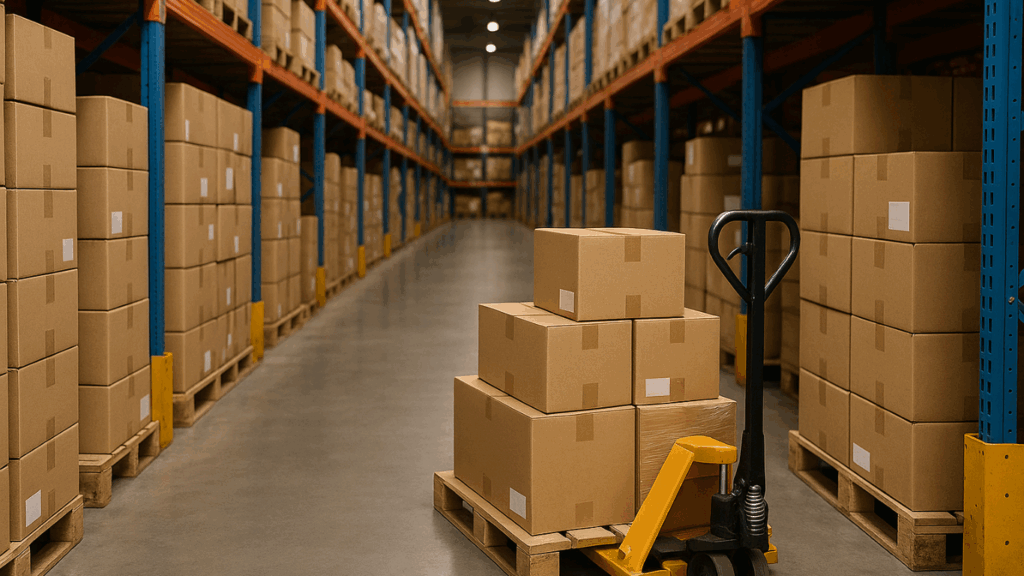In today’s competitive business environment, especially in e-commerce and retail, effective inventory management is essential. For businesses that are growing rapidly, expanding across regions, or importing products internationally, having a solid system for managing stock can make the difference between success and costly inefficiency. That’s where Inventory Storage Services come in.
In this article, we’ll explore what inventory storage services really are, what types exist, how they benefit businesses, what to consider before choosing a provider, and how to make them a powerful part of your logistics strategy.
What Is an Inventory Storage Service?
An inventory storage service is a logistics solution that allows businesses to store their products or materials in a managed warehouse facility operated by a third-party provider. These providers are often equipped with advanced inventory tracking systems, security, climate control (if needed), and logistics support.
Unlike traditional storage options where you rent a space and manage it yourself, inventory storage services typically include:
- Receiving and documenting goods
- Organized storage with inventory systems
- Real-time stock monitoring
- Order picking and packing
- Distribution and shipping coordination
In essence, this is not just a place to “keep stuff.” It’s an end-to-end service that supports your entire supply chain.

Types of Inventory Storage Solutions
There are several types of inventory storage services tailored to different business needs. Here are some common categories:
Public Warehousing
A shared facility where multiple businesses store their products. It’s ideal for startups and SMEs that don’t want to commit to long-term warehouse leases. You pay only for the space and services you use.
Private Warehousing
A dedicated space (either rented or owned) used exclusively by one business. While more expensive, it offers full control and is suited for large enterprises with high storage volume.
Fulfillment Centers
Popular with e-commerce businesses, these facilities not only store products but also handle order processing, packaging, and shipping. They’re especially valuable for businesses selling on platforms like Amazon, Shopify, or Lazada.
Climate-Controlled Storage
For businesses dealing with temperature-sensitive items (e.g., cosmetics, pharmaceuticals, electronics), climate-controlled warehouses maintain stable temperature and humidity levels.
Cross-Docking Facilities
In this model, goods are received and immediately shipped out without long-term storage. It reduces handling time and storage cost but requires tight coordination.
Understanding these options helps businesses match the right service to their growth stage, product type, and logistics strategy.

How Inventory Storage Services Benefit Your Business
Whether you’re an importer, wholesaler, or e-commerce seller, inventory storage services can unlock a wide range of benefits:
-
Cost Efficiency:
Storing goods in a well-managed warehouse can reduce overhead, especially compared to managing your own facility. You avoid paying for unused space, hiring warehouse staff, and maintaining infrastructure.
-
Scalability:
Need more space during peak season? Want to reduce stock in the off-season? Inventory storage services give you flexibility without long-term commitment.
-
Improved Order Fulfillment:
With dedicated staff, automated systems, and optimized layouts, third-party warehouses can prepare and ship orders faster and more accurately than in-house operations.
-
Risk Reduction:
Professionally managed storage reduces the risk of theft, fire, or damage. Many facilities also offer insurance options and 24/7 monitoring.
-
Geographic Reach:
Using storage facilities in strategic locations (such as near ports or major cities) allows faster shipping to customers and reduces lead times.
-
Inventory Accuracy:
With barcoding, RFID, and real-time dashboards, you always know your exact stock level — reducing the chances of overselling or stockouts.
What to Consider When Choosing an Inventory Storage Provider
Not all warehouse providers offer the same value. When selecting a storage partner, consider the following:
-
Location:
Choose a facility that’s close to your suppliers, target market, or shipping hub. This helps minimize transportation time and cost.
-
Technology:
Look for warehouses that use modern inventory management systems. Integration with your e-commerce platform or ERP system is a big plus.
-
Pricing Model:
Understand the cost structure. Do they charge by square meter, CBM, pallet, or unit? Are there hidden fees for handling, peak-season surcharges, or late retrieval?
-
Services Included:
Does the provider offer fulfillment (pick, pack, ship), returns handling, labeling, or quality checks? Know what’s included and what’s extra.
-
Security & Compliance:
Verify that the facility has proper licenses, insurance, fire suppression systems, and security protocols — especially for high-value or regulated products.
-
Flexibility & Scalability:
Can the provider adjust to your business growth? Can you start small and expand when needed?
Choosing the right partner is critical to building a reliable logistics foundation for your business.

How to Integrate Inventory Storage into Your Business Strategy
Using inventory storage services should not be treated as a side task. Instead, integrate it into your operations, sales, and customer experience strategy.
Plan inventory levels intelligently
Use sales history and market trends to determine how much stock to keep in storage. Don’t overstock — but don’t risk running out either.
Use multiple warehouses
If you sell nationwide (or across countries), consider storing products in different cities to reduce delivery times and shipping costs.
Automate wherever possible
Connect your inventory system to the warehouse via API or software integration. Real-time updates prevent miscommunication and speed up fulfillment.
Outsource fulfillment to stay lean
Focus your internal team on sales, marketing, and product development. Let fulfillment experts handle logistics.
Test new markets easily
With flexible warehousing, you can test new product categories or regions without committing to physical infrastructure.
When used strategically, inventory storage doesn’t just support operations — it becomes a key driver of growth, customer satisfaction, and profitability.

Conclusion
Inventory storage services are more than just physical space — they’re a smart, scalable way to manage your products, optimize your supply chain, and grow your business. Whether you’re just getting started, scaling rapidly, or entering new markets, the right storage solution can save you time, money, and a lot of stress.
If you’re considering using a storage and fulfillment service that integrates directly with your China import flow, providers like JAWANDA CARGO offer complete solutions — from factory to warehouse to last-mile delivery. That means you can focus more on growing your brand while they handle the logistics.


